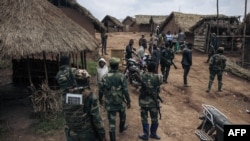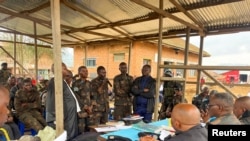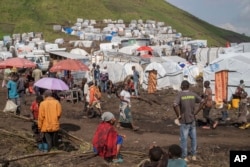The U.S. Department of State accused Rwanda and Uganda of illegally extracting minerals, including gold and tantalum, from Congo in a July 8 statement.
"These minerals directly or indirectly benefit armed groups and move out of the country through Rwanda and to Uganda before moving to major refining and processing countries," the State Department said.
Uganda denied involvement, saying it is cooperating closely with Congolese government forces in fighting the armed groups.
Rwandan President Paul Kagame did not deny the accusations against his country's role in plundering Congo's minerals, trying instead to falsely implicate the U.S.
A day before winning the presidential election with 99% of the popular vote on July 14, Kagame told journalists in the capital city of Kigali:
''The United States does more mining in Eastern Congo or in Congo than Rwanda can ever do."
That is false.
The U.S. does not allow conflict minerals in its territories. There is no evidence that the U.S. government is involved in Congolese minerals extraction.
There is abundant evidence from numerous U.N. reports, civil society groups, and the Congolese government proving the illegal trade of Congolese gold and other minerals in Rwanda and Uganda.
The U.S. State Department said it issued the recent statement on illegal mining and trade of Congo's natural resources "in response to requests from the private sector for the U.S. government to clarify potential risks associated with manufacturing products using minerals extracted, transported, or exported from the eastern DRC, Rwanda, and Uganda.''
In 2010, the U.S. Congress passed the Dodd-Frank Act that requires the U.S. publicly listed companies to do "due diligence" on their supply chains of the minerals they import to make sure they do not originate from Congo and take steps to address any risks they find.
In a June 13 report, the U.N. group of experts on Congo exposed the "illegal trade of gold extracted in the Democratic Republic of Congo through its neighboring countries, in particular Rwanda and Uganda."
According to the U.N. report, "sources interviewed by the Group in Rwanda acknowledged that the Democratic Republic of the Congo gold at a minimum transited through Rwanda."
The U.N. experts quoted Kagame's reflection on Rwanda's role in the trade of illegal minerals from Congo.
It said that during the swearing-in of new ministers of the government of Rwanda on November 30, 2022, Kagame made the following remarks
''Some people come from Congo, whether they smuggle or go through the right channel, they bring minerals, but most of it goes through here but does not stay here. It goes to Dubai, to Brussels, Tel Aviv... ."
United Nations, other world institutions and governments accuse Rwanda of backing M23 rebels sanctioned internationally for human rights abuses.
In March 2023, Congolese Finance Minister Nicolas Kazadi said the war-torn country was "losing $1bn a year in minerals that were being illegally smuggled into Rwanda."
Kazadi told the Financial Times that in 2022, "Rwanda exported close to $1bn in gold, tin, tantalum, and tungsten, even though the country has few mineral deposits of its own."
He further claimed that Congo had evidence that Rwanda was stealing its minerals.
Since early the 2000s, human rights groups have documented the schemes used to smuggle gold and other minerals illegally mined in Congo through Rwanda and Uganda to the global markets in the United Arab Emirates, Europe and elsewhere.
In 2005, the New York-based Human Rights Watch reported that "Local warlords and international companies were among those benefiting from access to gold-rich areas while local people suffer from ethnic slaughter, torture, and rape.''
The International Crisis Group, a Belgium-based rights watchdog, linked the illegal mining of gold and other resources from Congo to Uganda and Rwanda in its report "A Deal with a Devil in the Heart of Great Lakes."








